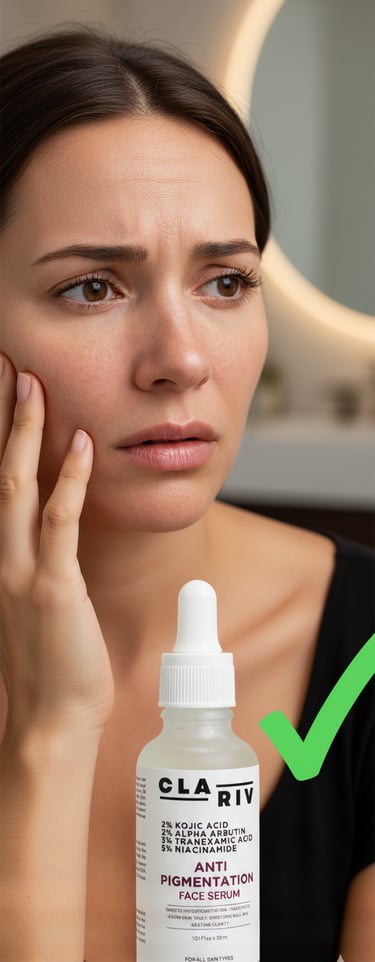FIRST TIME BUYER ? - Use Code FIRSTTIME to enjoy 5% additional discount on entire store
Why Your Pigmentation Isn’t Fading – And How to Fix It
Learn why your pigmentation won’t fade and how CLARIV Anti Pigmentation Serum with powerful actives helps fix dark spots and uneven tone fast.
11/11/20252 min read


Understanding Why Pigmentation Persists
If you’ve tried multiple creams, masks, or even home remedies but your pigmentation still won’t fade — you’re not alone. Stubborn dark spots, uneven skin tone, and patches are common among Indian skin types due to deeper melanin levels and frequent sun exposure. But the key to fading pigmentation isn’t about using “stronger” products — it’s about using the right ingredients, consistency, and protection.
Common Reasons Why Pigmentation Doesn’t Fade
1. Skipping Sunscreen
UV rays are the biggest culprit behind pigmentation. Even if you’re indoors, sunlight can penetrate windows and screens, re-triggering melanin production. Without sunscreen, even the best serums can’t help.
Fix: Use a broad-spectrum mineral sunscreen like CLARIV Mineral Sunscreen SPF 50 PA++++. It provides daily protection from UVA, UVB, and blue light — without clogging pores or leaving a white cast.
2. Inconsistent Skincare Routine
Applying a serum “sometimes” won’t deliver results. Pigmentation repair requires consistent morning and night application for at least 4–6 weeks.
Fix: Follow a simple routine —
Morning: Cleanser → Vitamin C Serum → Sunscreen
Night: Cleanser → Anti-Pigmentation Serum → Moisturizer
3. Using the Wrong Ingredients
Many products claim to fade pigmentation but don’t contain clinically proven actives. Ingredients like Niacinamide, Alpha Arbutin, Kojic Acid, and Tranexamic Acid work by blocking excess melanin production.
Fix: Try CLARIV Anti-Pigmentation Serum, powered by dermatologist-approved actives that target melanin at its root and brighten skin evenly.
4. Not Exfoliating Regularly
Dead skin buildup can prevent active ingredients from penetrating deeper. If you never exfoliate, your serums might just sit on top of your skin.
Fix: Use a mild exfoliant (like a lactic acid toner or gentle scrub) twice a week to remove dead cells and boost absorption.
5. Hormonal Triggers
Sometimes pigmentation is hormonal (like melasma). In that case, topical treatments alone may not be enough.
Fix: Combine your skincare with medical consultation. Topical actives like Niacinamide and Alpha Arbutin can still help lighten marks gradually when used under sunscreen protection.
The Right Way to Treat Pigmentation
Step 1: Protect
Apply sunscreen every morning — even when indoors. Reapply every 3–4 hours if you’re outside.
Step 2: Treat
Use a targeted Anti-Pigmentation Serum that includes brightening actives.
CLARIV Anti-Pigmentation Serum is specially formulated for Indian skin tones and includes science-backed ingredients to reduce dark spots and dullness.
Step 3: Repair
Support your routine with a Vitamin C Serum to boost radiance and fight oxidative stress.
CLARIV Vitamin C 10% Serum enhances glow while working alongside the Anti-Pigmentation Serum for faster visible results.
Visible Results — The Right Way
You won’t see miracles overnight, but within 3–4 weeks of consistent use, you’ll notice:
Dark spots fading visibly
Skin tone looking more even
Natural radiance returning
Lesser new pigmentation forming
CLARIV’s Proven Pigmentation-Care Combo
For best results, use:
Morning: CLARIV Vitamin C Serum + CLARIV Mineral Sunscreen
This combination protects, brightens, and repairs — giving your skin a uniform glow and long-term clarity.
Key Takeaway
Your pigmentation isn’t fading because your skincare lacks protection, patience, or potent ingredients. But the fix is simple — protect daily, treat consistently, and repair with the right actives.
Choose CLARIV’s dermatologist-formulated serums — trusted, affordable, and made for Indian skin.
info@clariv.in
+91-92204-02087
